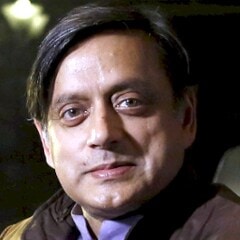Tharoor Line | Can a danseuse's Bharatanatyam steps rock Hinduism?

The decision of the Koodalmanikyam Temple board in Thrissur district on Sunday to cancel a Bharatanatyam performance on the temple premises by the acclaimed artiste Mansiya VP is deplorable, Shashi Tharoor writes in his latest column.
The decision of the Koodalmanikyam Temple board in Thrissur district on Sunday to cancel a Bharatanatyam performance on the temple premises by the acclaimed artiste Mansiya VP is deplorable, Shashi Tharoor writes in his latest column.
The decision of the Koodalmanikyam Temple board in Thrissur district on Sunday to cancel a Bharatanatyam performance on the temple premises by the acclaimed artiste Mansiya VP is deplorable, Shashi Tharoor writes in his latest column.
The decision of the Koodalmanikyam Temple board in Thrissur district on Sunday to cancel a Bharatanatyam performance on the temple premises by the acclaimed artiste Mansiya VP is deplorable. The performance was slated for April 21, as part of a 10-day festival at the temple, at which some 800 persons are performing, but Mansiya, who was born a Muslim and describes herself as an atheist, has been told she is not welcome because she is not a Hindu. As a Hindu and a citizen of India, I wish to register my disappointment with this decision.
Mansiya, a well-regarded exponent of Bharatanatyam and a doctoral-level research scholar in the subject at Kerala Kalamandalam in addition to being a dancer, revealed that she had been asked whether she had converted to Hinduism after her marriage to violinist Shyam Kalyan, and had replied that she had no religion. That was enough to cause her exclusion from the temple premises, even though there was no doubt about the quality and purity of her Bharatanatyam. Art has no religion or caste, but in our state, art has been overruled by religion.
There are many things wrong with this decision, which follows a similar ruling by the Guruvayur temple. Other faiths go out of their way to attract others to respect their religion, throwing open the doors of mosques, churches, gurudwaras and synagogues to all. As a public representative in Thiruvananthapuram I have attended Christmas Eve Mass at St Joseph’s Cathedral, celebrated Eid at Palayam’s Juma Masjid and been received with honour at the sacred sites of every Christian sect. I have walked on the hallowed ground of the Al-Aqsa Mosque in Jerusalem, offered prayers alongside Jewish friends at the Wailing Wall there and bowed my head at the Church of the Nativity. When I ask myself why some of my fellow Hindus prefer to shut our temples to outsiders, instead of welcoming them with open arms to breathe the sanctified air of our places of worship, I find no good answer.
The temple board chairman, Pradeep Menon, explains that the decision is in keeping with “the existing tradition at the temple.” Traditions, of course, change with the times: it was also the existing tradition at every temple to deny Dalits entry a century ago, but that is an unthinkable thought today. I can understand reluctance to permit access to outsiders to the sanctum sanctorum, where an idol has been installed with a prathishtha. But a dance on the temple premises? Surely Mansiya, who dances with reverence and talent, is no threat to the sanctity of the place.
Loudspeakers at Guruvayur play the songs of Yesudas while the temple denies the singer entry because of an accident of birth. This is not the religion of “vasudaiva kutumbakam” – the world is one family – and “sarva dharma sambahava” – all religions are the same. This is not the faith that, in Swami Vivekananda’s memorable words, taught the world not just tolerance but acceptance of difference, and recognised that “ekam sat vipra bahuda vadanti” – Truth is one, but sages call it by different names. Instead, the Hinduism on display in such decisions is the petty creation of small men who make rules that reflect their own prejudices. It does no credit to the faith that I am proud to profess when it claims to be so fragile that it would be vulnerable to the bare footsteps of a non-Hindu danseuse.

